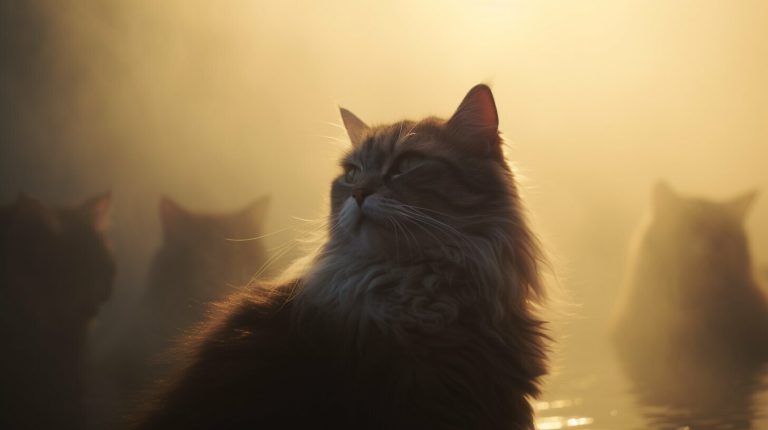Why Are Lions King of the Jungle? Unraveling the Roaring Mystery!
Lions, the majestic rulers of the animal kingdom, have captivated the world with their powerful roars and commanding presence. But what makes them truly deserving of the title “King of the Jungle”? Let’s embark on a thrilling adventure to uncover the secrets behind their regal status.
Key Takeaways:
- Lions are considered the kings of the jungle due to a combination of factors.
- Their powerful roar serves as a form of communication within the pride and a declaration of dominance and presence.
- Lions live in social groups called prides, with males using their roar to establish territory and attract mates.
- The lion’s physical characteristics, such as size, strength, and hunting prowess, contribute to their regal status.
- Their social structure within prides, with a dominant male leading and lionesses hunting and caring for the pride, further enforces their king-like status.
Lions’ Powerful Roar: Communication and Dominance
Lions, with their mighty roars that echo through the savannah, use this vocal prowess to communicate with other pride members and assert their dominance in the animal kingdom. Their roar serves as a powerful tool for various purposes within the pride. It acts as a form of communication, allowing lions to convey important messages to one another, such as signaling danger, coordinating hunting strategies, or simply keeping in touch with the rest of the group.
Furthermore, the lion’s roar serves as a declaration of dominance, establishing their territory and warding off potential intruders. By producing a deep and resonating sound that can travel long distances, lions are able to assert their presence and deter other animals from encroaching into their domain. It is an audible manifestation of their power and authority, a sonic warning to rivals that they are not to be challenged lightly.
Not all lions possess the ability to roar, though. It is typically only the adult males with fully-grown manes that have this capability. Their long and flowing manes, in addition to being visually striking, also serve as an acoustic amplifier for their roars, making them even more impressive and intimidating. This distinguishes them as the dominant males within the pride, with their roars acting as a vocal badge of their status and strength.
In conclusion, the lion’s powerful roar acts as both a means of communication and a symbol of dominance. It enables lions to communicate effectively within their pride, maintain social cohesion, and coordinate various activities. Additionally, their roaring serves as a territorial marker, a warning to intruders, and a display of dominance, establishing the lion as the king of the jungle.
The Social Structure of Lion Prides
Within a lion pride, a complex social structure emerges, with a dominant male at the helm, leading a group of lionesses in their hunting endeavors and ensuring the survival and prosperity of the pride. This hierarchical organization is essential for the functioning and success of the pride in the wild.
The dominant male lion, often referred to as the “king,” assumes a leadership role within the pride. He is responsible for defending the pride’s territory from intruders and rival males, as well as mating with the female lions to ensure the continuation of their lineage. With his majestic presence and powerful roar, he commands respect and authority.
The lionesses form the backbone of the pride, playing a vital role in hunting and raising the cubs. They work together in coordinated strategies to bring down large prey, utilizing their agility, speed, and hunting prowess. Their synchronized efforts demonstrate their exceptional teamwork and cooperation, showcasing the strength of their social bonds.
| Key Features of Lion Social Structure | |
|---|---|
|
– African Proverb |
The social structure of lion prides is not only important for their survival but also contributes to their regal status. The unity and cooperation within the pride ensure the protection and well-being of its members. Each lion plays a unique role, combining their individual skills and strengths to create a formidable force in the wild.
In conclusion, the social structure of lion prides exemplifies the harmony and interdependence within their community. The dominant male, leading a group of dedicated lionesses, forms a formidable team that upholds the pride’s survival and prospers in the challenging wilderness. The intricate interactions, collaborative hunting strategies, and strong social bonds make lions an awe-inspiring symbol of power, strength, and unity in the animal kingdom.
The Hunting Habits of Lions
Armed with exceptional speed, agility, and stealth, lions employ a combination of teamwork, strategy, and sheer strength to bring down a variety of prey species within their natural habitat. Lions are known for their ability to work together as a coordinated group, utilizing a combination of individual skills and collective intelligence to increase their chances of success. This teamwork is particularly evident during group hunts, where lions strategically position themselves to surround and ambush their chosen target.
When hunting, lions primarily rely on their keen eyesight and hearing to detect prey in the surrounding area. Once a potential target is identified, they use their stealth and patience to slowly and silently approach, taking advantage of any available cover in the terrain. With their muscular bodies and powerful legs, lions can quickly accelerate towards their prey, reaching speeds of up to 50 miles per hour in short bursts.
Upon closing in on their prey, lions unleash a swift and overpowering attack, aiming to take down their victim with a decisive bite to the neck or throat. Their strong jaws and sharp teeth make quick work of the task, ensuring a swift and efficient kill. The size and strength of lions also allow them to bring down larger prey, such as wildebeests and zebras.
While male lions are often credited with being the primary hunters, it is the lionesses that play a crucial role in providing food for the pride. These skilled hunters work in teams, using their superior hunting instincts and agility to coordinate attacks and secure a meal for the entire pride. This division of labor allows the lionesses to maximize their efficiency and effectiveness as hunters, while also ensuring the survival and well-being of the pride as a whole.
| Prey Species | Typical Hunt Success Rate |
|---|---|
| Gazelle | 70-80% |
| Wildebeest | 60-70% |
| Zebra | 50-60% |
The Regal Symbolism of Lions
The majestic appearance, commanding presence, and unwavering courage of lions have forever established them as the ultimate symbol of kingship and dominance, both in the wild and in human culture. Lions possess a regal aura that captivates our imagination and evokes feelings of power and authority. It is no wonder that they have been portrayed as majestic rulers throughout history, from ancient civilizations to modern-day societies.
As apex predators, lions play a crucial role in maintaining the balance of ecosystems. Their presence ensures the control of herbivore populations, thus preventing overgrazing and promoting the health of the entire ecosystem. Their hunting prowess and ability to take down large prey exemplify their status as formidable rulers in the animal kingdom.
In human culture, lions have long been associated with royalty and nobility. Their regal stature and strength have made them a popular symbol of power and authority. From heraldry to literature, lions have been depicted as guardians, protectors, and emblems of strength. Their image adorns flags, coats of arms, and other national symbols, representing the might and sovereignty of nations.
Moreover, lions have served as powerful metaphors for leadership and bravery. Their fearlessness in the face of danger has inspired countless tales of heroism and valor. Lions’ social structure, with a dominant male leading the pride, represents a hierarchical system that parallels human societies.
| Lion Symbolism | Meaning |
|---|---|
| Strength and Courage | The lion’s physical power and bravery symbolize strength and the ability to overcome challenges. |
| Leadership and Authority | The lion’s role as the king of the jungle reflects leadership and the exercise of power and dominion. |
| Nobility and Royalty | The regal appearance and demeanor of lions are associated with nobility and royal status. |
| Protection and Guardianship | Lions are often seen as protectors and guardians, defending their territory and family. |
Conclusion
Throughout our roaring adventure, we have uncovered the secrets behind why lions are hailed as the kings of the jungle, from their powerful roars to their complex social structure and remarkable hunting abilities. Their regal symbolism and vital role in the ecosystem further solidify their status as the true rulers of the wild.
Lions are considered the kings of the jungle due to a combination of factors. One key reason is their powerful roar, which serves multiple purposes such as communication within the pride and as a declaration of dominance and presence. Lions live in social groups called prides, with males roaring to establish their territory and attract potential mates. Not all lions roar, as it is typically only adult males with fully-grown manes that possess this ability.
Lions are also known for their physical characteristics, including their size, strength, and hunting prowess. They have superior speed, agility, and stealth, allowing them to take down a wide range of prey. Their social structure within prides with a dominant male leading and lionesses hunting and caring for the pride contributes to their regal status.
Additionally, lions’ impressive physical attributes and cultural symbolism, such as their regal appearance, commanding presence, and association with power and authority, have made them the enduring symbol of kingship and dominance. Overall, the lion’s combination of strength, bravery, fearlessness, powerful roar, and social structure contribute to their title as the king of the jungle.
FAQ
Why are lions considered the kings of the jungle?
Lions are considered the kings of the jungle due to their powerful roar, impressive physical characteristics, and regal social structure within prides.
What is the purpose of a lion’s roar?
Lions use their roar for communication within the pride, establishing dominance and territory, and attracting potential mates.
Do all lions roar?
No, typically only adult male lions with fully-grown manes possess the ability to roar.
What makes the lion’s roar so powerful?
The lion’s roar is powerful due to the specialized structure of their vocal cords, allowing them to produce loud and deep sounds.
What is a lion pride?
A lion pride is a social group in which lions live together. It usually consists of one dominant male, lionesses, and their offspring.
How do lions establish their territory?
Male lions establish their territory by roaring to scare off intruders and mark their presence. This helps maintain the pride’s boundaries.
How do lions hunt?
Lions are skilled hunters that use a combination of strength, speed, agility, and stealth to take down a wide range of prey. They often hunt in coordinated groups.
Why are lions associated with power and authority?
Lions’ regal appearance, commanding presence, and cultural symbolism as the “King of the Jungle” have made them a powerful symbol of leadership and dominance.
- Discovering Why Do Women Wear Lipstick: A Deeper Look - 19/12/2023
- Why Do Golfers Only Wear One Glove? - 16/12/2023
- Why Don’t Hobbits Wear Shoes? - 14/12/2023
Hi, I’m Rhiannon, the lead author behind The News Wire. As a passionate journalist, I strive to bring you the latest news and updates from all over the world. With a keen eye for detail and a dedication to unbiased reporting, I aim to deliver well-researched and informative articles that keep you informed and engaged. From breaking news to in-depth analyses, I cover a wide range of topics with the aim of keeping you in the loop. Join me on The News Wire as we explore the dynamic and ever-changing landscapes of global events, uncovering the stories that matter most.






